Democratic Progressive Party (DPP) Chairperson Tsai Ing-wen (蔡英文) on Wednesday said that she is committed to a “consistent, predictable and sustainable” relationship with China.
In a major speech that was certain to be closely studied by the White House, she said that cross-strait relations must be considered in a long-term context.
“Freedom and democracy are values deeply ingrained in the hearts of the Taiwanese people,” the DPP’s presidential candidate for January’s election said.
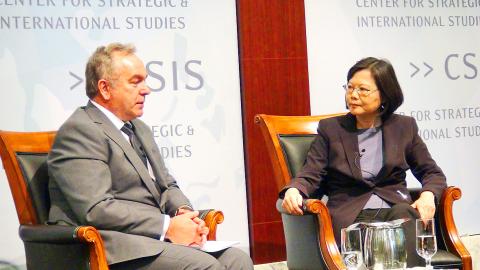
Photo: CNA
“The conduct of cross-strait policy must transcend the position of a political party and incorporate different views,” she said. “A leader must take into account public consensus when making decisions. We do have a broad consensus in Taiwan — maintenance of the status quo.”
Later, members of the packed audience at the Center for Strategic and International Studies (CSIS) tried time and again to prod Tsai into expanding on her views of the so-called “1992 consensus.”
However, she consistently refused to do so, referring them back to her just-completed 20-minute address.
At one point, Tsai did answer: “China, the US and Taiwan have different interpretations, may have differences, but we should all agree that maintaining the status quo relationship across the Taiwan Strait serves the interests of everybody.”
It was the main speech to be delivered during her 12-day tour to the US and it came in the midst of meetings with top Washington officials, politicians and think tank experts.
Tsai was introduced by senior adviser for Asia at CSIS Bonnie Glaser and later answered questions from former US assistant secretary of state for East Asian and Pacific affairs Kurt Campbell.
Tsai said she had articulated and reiterated her position of maintaining the “status quo” and that if elected, she would push for the peaceful and stable development of cross-strait relations in accordance with “the will of the Taiwanese people and the existing Republic of China constitutional order.”
Tsai said that the two sides of the Taiwan Strait should treasure and secure the accumulated outcomes of more than 20 years of negotiations and exchanges.
“These accumulated outcomes will serve as the firm basis of my efforts to further the peaceful and stable development of cross-strait relations,” she said.
A Washington analyst later said that the speech would probably satisfy US officials, who were primarily concerned with the DPP’s ability to maintain peace across the Taiwan Strait and not overly upset Beijing.
Tsai said that she would push for a cross-strait agreement oversight bill to establish a comprehensive set of rules overseeing cross-strait exchanges and negotiations.
“The cross-strait agreements which are currently under negotiation or legislative review will be re-examined and further negotiated according to the new rules,” she said.
Tsai pledged to strengthen Taiwan’s democratic institutions and uphold the right of Taiwanese to decide their future free of coercion.
“While I advocate for constructive exchanges and dialogues with China, I will ensure the process is democratic and transparent, and that the economic benefits are equitably shared,” she said.
The speech was attended by most of the leading Washington figures directly involved in Taiwan-US affairs, including American Institute in Taiwan Chairman Raymond Burghardt and US Representative of the Taipei Economic and Cultural Representative Office Shen Lyu-shun (沈呂巡).
“As Asia faces rising nationalism and the threat of military conflict, we intend to engage in proactive peace diplomacy that fosters peace and stability, with the spirit of giving and sharing,” Tsai said.
She said that the DPP was ready to undertake a new model of economic development based on innovation, “as well as to implement a community-based social safety net to compliment the traditional family-based care systems.”
Tsai said that the party was crafting a new Asian value in Taiwan to serve as an example and inspiration to others, and that it was ready to “light up Taiwan, light up Asia.”
She said she was ready to deal with rising domestic and external challenges ranging from the gradual erosion of freedom and democracy to an increasing uncertainty over Taiwan’s ability to maintain its economic autonomy.
“For most Taiwanese, the state of our economy is a source of great distress as it has stagnated for some time and has lost momentum for growth,” Tsai said.
She said the economic slowdown had hit the younger generation in particular and that finding a new economic way forward would be the foremost priority of the DPP.
The primary objective would be to reshape Taiwan’s economic competitiveness by shifting from an efficiency-driven model to an innovation-driven one.
Tsai said that she would build a strategic partnership with the US on economic cooperation and that there was an urgent need for Taiwan to participate in the proposed Trans-Pacific Partnership.
“For Taiwan’s economy to be more competitive and our democracy stronger, we need to build a military capable of safeguarding the country and maintaining peace,” she said.
To be a reliable partner on regional security, she said that proper investment in “credible deterrence” was key.
Tsai said that she would secure the resources necessary to provide adequate training and education for the active and reserve forces.
“In addition to foreign acquisition of defense systems and platforms, I am committed to more investment in indigenous defense programs, including research and development to meet our long-term defense needs,” she said.
Tsai said that Taiwan had a special political, security, economic and cultural bond with the US, but that Taiwan should not take the relationship for granted.
“I will ensure that Taiwan works together with the US to advance our common interests and by having a proactive diplomatic agenda for peace,” she said.
In related news, Minister of Foreign Affairs David Lin (林永樂) yesterday said that Taiwan’s president is elected by its people and that a recent remark by Chinese Ambassador to the US Cui Tiankai (崔天凱) implying that Tsai must meet the approval of the Chinese people was inappropriate.
Cui on Tuesday reportedly said that Tsai should pass the test of the 1.3 billion people in China by accepting the “one China” principle.
Asked to comment on the issue, Lin said Cui’s remarks were “quite inappropriate.”
Additional reporting by CNA
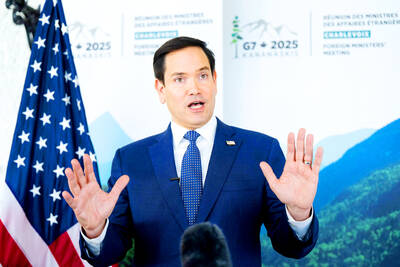
‘CROWN JEWEL’: Washington ‘can delay and deter’ Chinese President Xi Jinping’s plans for Taiwan, but it is ‘a very delicate situation there,’ the secretary of state said US President Donald Trump is opposed to any change to Taiwan’s “status quo” by force or extortion and would maintain that policy, US Secretary of State Marco Rubio told the Hugh Hewitt Show host on Wednesday. The US’ policy is to maintain Taiwan’s “status quo” and to oppose any changes in the situation by force or extortion, Rubio said. Hewitt asked Rubio about the significance of Trump earlier this month speaking with Taiwan Semiconductor Manufacturing Co (台積電) chairman C.C. Wei (魏哲家) at the White House, a meeting that Hewitt described as a “big deal.” Asked whether the meeting was an indication of the
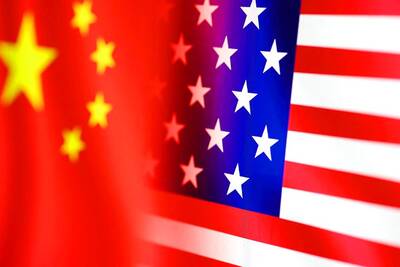
‘RELATIVELY STRONG LANGUAGE’: An expert said the state department has not softened its language on China and was ‘probably a little more Taiwan supportive’ China’s latest drills near Taiwan on Monday were “brazen and irresponsible threats,” a US Department of State spokesperson said on Tuesday, while reiterating Washington’s decades-long support of Taipei. “China cannot credibly claim to be a ‘force for stability in a turbulent world’ while issuing brazen and irresponsible threats toward Taiwan,” the unnamed spokesperson said in an e-mailed response to media queries. Washington’s enduring commitment to Taiwan will continue as it has for 45 years and the US “will continue to support Taiwan in the face of China’s military, economic, informational and diplomatic pressure campaign,” the e-mail said. “Alongside our international partners, we firmly
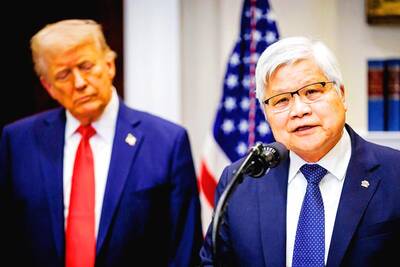
KAOHSIUNG CEREMONY: The contract chipmaker is planning to build 5 fabs in the southern city to gradually expand its 2-nanometer chip capacity Taiwan Semiconductor Manufacturing Co (TSMC, 台積電), the world’s biggest contract chipmaker, yesterday confirmed that it plans to hold a ceremony on March 31 to unveil a capacity expansion plan for its most advanced 2-nanometer chips in Kaohsiung, demonstrating its commitment to further investment at home. The ceremony is to be hosted by TSMC cochief operating officer Y.P. Chyn (秦永沛). It did not disclose whether Premier Cho Jung-tai (卓榮泰) and high-ranking government officials would attend the ceremony. More details are to be released next week, it said. The chipmaker’s latest move came after its announcement earlier this month of an additional US$100 billion
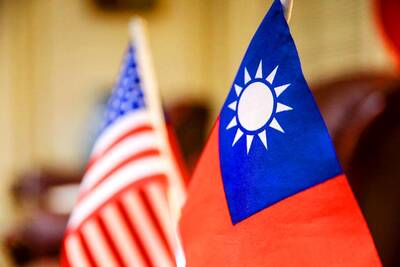
COUNTERING THE PLA: While the US should reinforce its relations with partners and allies, Taiwan must invest in strengthening its defenses as well, Phillip Davidson said If influence in the Indo-Pacific region is one of the US’ core interests, then Taiwan serves as a cornerstone of US economic and security influence in the region, former US Indo-Pacific Command commander admiral Phillip Davidson said on Thursday. “China’s ... strategy is to supplant the US leadership role in the international order ... and they’ve long said ... that they intend to do that by 2050,” Davidson told the National Review Institute’s Ideas Summit in Washington. Davidson said he had previously told US Senate hearings on China’s military activities and possible threats in the Indo-Pacific region that a Chinese invasion of